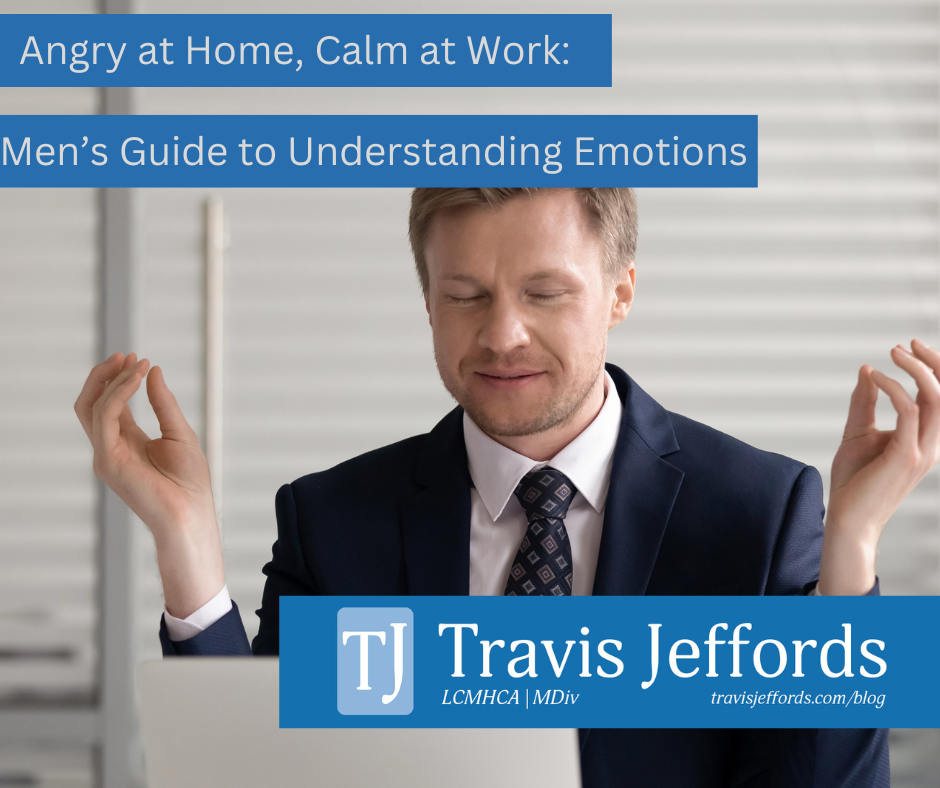Reducing Male Anger in Relationships: Ending The Blame Game
You know you can’t keep repeating the same pattern over and over in your relationship - but you can’t figure out what to do differently.
The words may change, but it seems like you’re having the same kinds of fights over and over again.
In this post, I’ll share with you the essential shift men have to make in order to change their lives, and change their relationships from blame to connection - based on Marshall Rosenberg’s incredible work on Nonviolent Communication.
Taking Responsibility to Shift Your Own Response
Before we get to shifting from blame to connection - here’s an essential thing that all men need to hear:
First and foremost - you are responsible for changing yourself.
I don’t know what you’re going through, and I don’t know what your partner is going through - but I am 100% certain that you can only control your actions in the relationship. And since the only thing you can shift, change, grow, evolve or develop is yourself - that’s a great place to start.
You may read this post and think ‘hey - my partner is communicating in all of the ways they’re not supposed to!’. That may totally be true. It probably is! But here’s the deal - you are the only thing you can change - so…start there.
But here’s some hopeful news - as you change yourself, and change the kind of emotional energy that you bring with you when you interact with others, there will be a shift in all your relationships. It’s all interconnected. So, you can only change you, but, changing you changes the chemistry, or dynamic, or energy - whatever you want to call it - that exists between you and your partner.
The Blame Game
”The Blame Game” is the mode of operating that most men go through life operating from. In The Blame Game the whole world of complex relationships and people narrows down to two simple options:
It’s YOUR fault.
It’s MY fault.
Lots of times couples will get caught in The Blame Game. They go back and forth, certain that ‘it’s YOUR fault’. Of course a conversation like the following when you go out to dinner on a Friday night will leave you and your partner frustrated and angry!:
“I can’t believe they said it’s an hour wait - why didn’t you make a reservation!” (it’s YOUR fault)
“You never told me to make a reservation! You always blame me for what goes wrong but I didn’t hear you speaking up about where we should go to dinner. I didn’t hear you making a reservation.” (it’s YOUR fault)
“I never wanted to go to dinner in the first place! You spend money like it grows on trees! We have bills to pay!” (it’s YOUR fault)
“You never want to do anything for me. Even on our vacations you grumble about how much money we’re spending…my friend’s husbands take them out to nice restaurants all the time! Why can’t you be more like them?” (it’s YOUR fault).
Okay. So at this point both partners are angry and frustrated. Did you notice the unspoken message behind every line they spoke? It was ‘it’s YOUR fault’. Likely each partner only knows how to play The Blame Game, and so,they responded with “it’s YOUR fault’. The words change from conversation to conversation, but they are stuck playing The Blame Game.
How does this conversation usually end? In anger or rage or an explosion?
And after that explosion, what usually happens is that men will shift the Blame Game from blaming their partner to blaming themselves. The only thing men have been taught to do is blame someone, because someone has to be a fault…so in those moments of stillness and reflection after an explosion they shift to blaming themselves.
They’ll think or say things like:
“Why did I get so upset about a stupid reservation? What is wrong me with?” (it’s MY fault)
“Why can’t I just keep my stupid mouth shut like everyone else?” (it’s MY fault)
“I always do this. I’m going to lose my partner like every other relationship I’ve ever been in” (it’s MY fault)
Because men don’t know there’s any other option, they will take on the role of ‘it’s MY fault’ for a while, and for a while it can even create the illusion of momentary peace in the relationship. Both partners agree it’s the man’s fault, and so everyone is on the same page. And if a man stays here too long - it can lead to feelings of self-hatred and depression.
But what usually happens is the other partner begins to play The Blame Game again, and at some point, you can’t sit back and say ‘it’s MY fault’ any longer’...you start telling your partner ‘it’s YOUR fault’, and the whole cycle repeats all over again.
But there is another way of being in the world. One where you can let The Blame Game go entirely, and shift towards experiencing deep connection with yourself and your partner.
From Blame to Curiosity, Connection, and Understanding
In The Blame Game the only two ways men have of understanding their relationships are either a) it’s YOUR fault, or b) it’s MY fault. In order to shift out of that game altogether we need a totally different mindset and framework.
Instead of needing to find someone to blame (which means someone is WRONG), we shift into trying to understand what is happening, and assume that it actually all makes sense (NO ONE IS WRONG).
If we assume that it all makes sense, then we shift from blaming to doing the following:
Exploring my own feelings and needs
Exploring my partner’s feelings and needs
Again, it’s not about right and wrong - it’s about curiosity and exploration. We explore with the assumption that there are good reasons that both us, and our partner are feeling what they are feeling at the moment.
So - first we explore what it is we or our partner is feeling. And then second, we explore what we or our partner is needing.
Let's go back to that original scene.Imagine your partner says the following again “I can’t believe they said it’s an hour wait - why didn’t you make a reservation!” (it’s YOUR fault).
This is what it might look like to focus on your partner's feelings and needs. We don’t know what they’re feeling, so, it’s just a guess, but, if I offer my partner the most generous interpretation possible, the conversation might be something like the following:
“It sounds like you’re feeling frustrated that we have to wait so long for dinner, and you’re feeling either overwhelmed or maybe alone in the amount of decision making that has to happen in our relationship? ”(Exploring my partner’s feelings)
“I am frustrated! I just feel like there’s so much that lands on my shoulders right now between work and home and my parents…it’s just a lot honestly”.(Slightly shifting out of The Blame Game into self-reflection)
“Yeah. So am I right that you’re feeling overwhelmed and it feels like a lot of responsibility is on your shoulders?” (Exploring my partner’s feelings)
“That’s right. I just don’t know how I can handle it all sometimes. I am feeling overwhelmed.” (Becoming aware of their own feelings)
“I hear that. It sounds like a lot. What do you need from me? What is one concrete thing I can do to help in some small or big way?” (Exploring my partner’s needs)
“Honestly, I’m not sure…well…I think it would be a huge help if I just didn’t have to worry about meals for us all the time. It’s just one more thing but it really adds up”. (Partner becomes aware of her needs)
“I can totally help with that. I can buy the groceries and make some meals, and I can even work on making a reservation from now on” (You hear and respect your partner’s needs) “But here’s the deal. I feel a little bit ashamed sometimes because of how poorly I cook…” (now you state your feelings). “I can buy the groceries and cook some easy meals and make reservations…but I just need you to be patient and supportive when I mess up occasionally. I promise you I’m going to try my best to help you though, okay?” (you stating your needs).
“Okay. Of course. I love you, and I’m so glad we’re in this together”.
Stick With It
Did you notice how that conversation went way different than the previous conversation where both partners were playing The Blame Game? Let me just offer one closing thought:
Shifting out of the Blame Game takes time and practice. Sometimes our partner may struggle to make that shift. If you find yourself getting curious about your partner's feelings and needs, and they continue to try to play The Blame Game…that’s often just a sign that they need a little more time feeling heard and understood before they feel safe enough and heard enough to move out of that game themselves.
Stay with it - continue to get curious about their feelings and emotions, and eventually they will feel heard enough that they will relax too. They’ll sense your curiosity and support and realize you’re on their side too.
Next Steps…
Shifting from blame to connection is an invaluable tool for navigating the complex world of emotions, particularly when it comes to men and anger. By practicing these techniques and becoming aware of feelings and needs, you can foster healthier relationships, promote understanding, and create safe spaces for authentic expression and intimacy.
One of the things that often comes up when I work with men on communication skills is that their bodies often become hijacked by strong emotions, making it impossible to shift out of that Blame Game mindset. That’s why I invite you to download my free video, "The 5 Coping Skills Every Man Needs to Know." This video offers practical, research-supported ways to calm yourself back down so that you can return to a space to be able to listen for feelings and needs again when you begin to become overwhelmed.
Mastering these skills takes time and practice. But by investing in your emotional well-being and adopting these communication tools, you can foster stronger connections and a healthier relationship. So why wait? Start your journey towards effective communication and emotional growth today.
Wishing you the best on your mental health journey.
Hi, I’m Travis.
My clients describe me as calm, compassionate, and curious…
You have these qualities inside you at your core too. You just need a little help uncovering them.
If you’re dominated by anger, anxiety, shame, or self-criticism, we can help you re-connect with who you really are: confident, calm, courageous, compassionate, and connected to yourself and others.
Travis Jeffords - LCMHCA | MDiv. | Male Counselor
In-person counselor: Greensboro & Winston-Salem
Virtual counselor: North Carolina
Licensed Counselor









